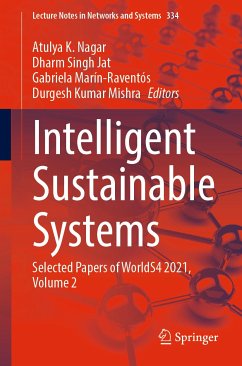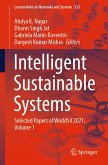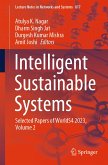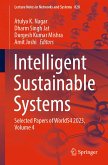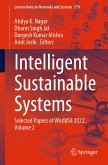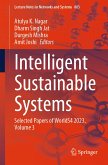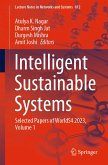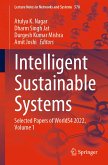Intelligent Sustainable Systems (eBook, PDF)
Selected Papers of WorldS4 2021, Volume 2
Redaktion: Nagar, Atulya K.; Mishra, Durgesh Kumar; Marín-Raventós, Gabriela; Jat, Dharm Singh
169,95 €
169,95 €
inkl. MwSt.
Sofort per Download lieferbar

85 °P sammeln
169,95 €
Als Download kaufen

169,95 €
inkl. MwSt.
Sofort per Download lieferbar

85 °P sammeln
Jetzt verschenken
Alle Infos zum eBook verschenken
169,95 €
inkl. MwSt.
Sofort per Download lieferbar
Alle Infos zum eBook verschenken

85 °P sammeln
Intelligent Sustainable Systems (eBook, PDF)
Selected Papers of WorldS4 2021, Volume 2
Redaktion: Nagar, Atulya K.; Mishra, Durgesh Kumar; Marín-Raventós, Gabriela; Jat, Dharm Singh
- Format: PDF
- Merkliste
- Auf die Merkliste
- Bewerten Bewerten
- Teilen
- Produkt teilen
- Produkterinnerung
- Produkterinnerung

Bitte loggen Sie sich zunächst in Ihr Kundenkonto ein oder registrieren Sie sich bei
bücher.de, um das eBook-Abo tolino select nutzen zu können.
Hier können Sie sich einloggen
Hier können Sie sich einloggen
Sie sind bereits eingeloggt. Klicken Sie auf 2. tolino select Abo, um fortzufahren.

Bitte loggen Sie sich zunächst in Ihr Kundenkonto ein oder registrieren Sie sich bei bücher.de, um das eBook-Abo tolino select nutzen zu können.
This book provides insights of World Conference on Smart Trends in Systems, Security and Sustainability (WS4 2021) which is divided into different sections such as Smart IT Infrastructure for Sustainable Society; Smart Management prospective for Sustainable Society; Smart Secure Systems for Next Generation Technologies; Smart Trends for Computational Graphics and Image Modeling; and Smart Trends for Biomedical and Health Informatics. The proceedings is presented in two volumes. The book is helpful for active researchers and practitioners in the field.
- Geräte: PC
- ohne Kopierschutz
- eBook Hilfe
- Größe: 21.84MB
Andere Kunden interessierten sich auch für
![Intelligent Sustainable Systems (eBook, PDF) Intelligent Sustainable Systems (eBook, PDF)]() Intelligent Sustainable Systems (eBook, PDF)113,95 €
Intelligent Sustainable Systems (eBook, PDF)113,95 €![Intelligent Sustainable Systems (eBook, PDF) Intelligent Sustainable Systems (eBook, PDF)]() Intelligent Sustainable Systems (eBook, PDF)137,95 €
Intelligent Sustainable Systems (eBook, PDF)137,95 €![Intelligent Sustainable Systems (eBook, PDF) Intelligent Sustainable Systems (eBook, PDF)]() Intelligent Sustainable Systems (eBook, PDF)186,95 €
Intelligent Sustainable Systems (eBook, PDF)186,95 €![Intelligent Sustainable Systems (eBook, PDF) Intelligent Sustainable Systems (eBook, PDF)]() Intelligent Sustainable Systems (eBook, PDF)233,95 €
Intelligent Sustainable Systems (eBook, PDF)233,95 €![Intelligent Sustainable Systems (eBook, PDF) Intelligent Sustainable Systems (eBook, PDF)]() Intelligent Sustainable Systems (eBook, PDF)169,95 €
Intelligent Sustainable Systems (eBook, PDF)169,95 €![Intelligent Sustainable Systems (eBook, PDF) Intelligent Sustainable Systems (eBook, PDF)]() Intelligent Sustainable Systems (eBook, PDF)137,95 €
Intelligent Sustainable Systems (eBook, PDF)137,95 €![Intelligent Sustainable Systems (eBook, PDF) Intelligent Sustainable Systems (eBook, PDF)]() Intelligent Sustainable Systems (eBook, PDF)233,95 €
Intelligent Sustainable Systems (eBook, PDF)233,95 €-
-
-
This book provides insights of World Conference on Smart Trends in Systems, Security and Sustainability (WS4 2021) which is divided into different sections such as Smart IT Infrastructure for Sustainable Society; Smart Management prospective for Sustainable Society; Smart Secure Systems for Next Generation Technologies; Smart Trends for Computational Graphics and Image Modeling; and Smart Trends for Biomedical and Health Informatics. The proceedings is presented in two volumes. The book is helpful for active researchers and practitioners in the field.
Dieser Download kann aus rechtlichen Gründen nur mit Rechnungsadresse in A, B, BG, CY, CZ, D, DK, EW, E, FIN, F, GR, HR, H, IRL, I, LT, L, LR, M, NL, PL, P, R, S, SLO, SK ausgeliefert werden.
Produktdetails
- Produktdetails
- Verlag: Springer Nature Singapore
- Seitenzahl: 834
- Erscheinungstermin: 16. Dezember 2021
- Englisch
- ISBN-13: 9789811663697
- Artikelnr.: 63147441
- Verlag: Springer Nature Singapore
- Seitenzahl: 834
- Erscheinungstermin: 16. Dezember 2021
- Englisch
- ISBN-13: 9789811663697
- Artikelnr.: 63147441
- Herstellerkennzeichnung Die Herstellerinformationen sind derzeit nicht verfügbar.
Atulya K. Nagar holds Foundation Chair as a professor of Mathematical Sciences and is pro-vice-chancellor for Research and Dean of the Faculty of Science at Liverpool Hope University, UK. He is also the head of the School of Mathematics, Computer Science, and Engineering, which he established at the University. He is an internationally respected scholar working at the cutting edge of theoretical computer science, applied mathematical analysis, operations research, and systems engineering. He received a prestigious Commonwealth Fellowship to pursue his doctorate (D.Phil.) in Applied Nonlinear Mathematics, which he earned from the University of York (UK) in 1996. He holds a B.Sc. (Hons.), an M.Sc., and M.Phil. (with distinction) in Mathematical Physics from the MDS University of Ajmer, India. His research expertise spans both applied mathematics and computational methods for nonlinear, complex, and intractable problems arising in science, engineering, and industry. GABRIELA MARÍN-RAVENTÓS received a M.Sc. in Computer Science from Case Western Reserve University in 1985 and a Ph.D. in Business Analysis and Research from Texas A&M University, USA, in 1993. She has been a Computer Science faculty member at Universidad de Costa Rica (UCR) since 1980. She was the dean of Graduate Studies and the director of the Research Center for Communication and Information Technologies (CITIC), both at UCR. Currently, she is a director of the Graduate Program in Computer Science and Informatics. She has organized several international and national conferences, and has been, and actually is, a chair of several program and editorial committees. From 2012 to 2016, she was the president of the Latin American Center for Computer Studies (CLEI), becoming the first woman to occupy such a distinguished position. Since September 2016, she has been vice-president of the International Federation for Information Processing (IFIP), in charge of the Digital Equity Committee. Her research interests include smart cities, human-computer interaction, decision support systems, gender in IT and digital equity. Durgesh Kumar Mishra has received M.Tech. degree in Computer Science from DAVV, Indore, in 1994 and Ph.D. degree in Computer Engineering in 2008. Presently, he has been working as a director and professor (CSE) at Sri Aurobindo Institute of Technology, Indore, MP, India. He is also a visiting faculty at IIT-Indore, MP, India. He has 24 years of teaching and 10 years of research experience. He has completed his Ph.D. on the area - Secure Multi-Party Computation for Preserving Privacy. He has published more than 90 papers in refereed international/national journals and conferences including IEEE, ACM conferences. His publications are listed in DBLP, Citeseer-x, Elsevier, and Scopus. He is a senior member of IEEE. He visited MIT Boston and presented his presentation on security and privacy. He also chaired a panel on "Digital Monozukuri" at "Norbert Winner in 21st century" at BOSTON. He became the member of Bureau of Indian standards (BIS), Govt. of India, for Information Security domain. Dharm Singh Jat is a professor of Computer Science at Namibia University of Science and Technology (NUST). He has guided about 8 Ph.D. and 24 master research scholars. He is the author of more than 150 peer-reviewed articles and the author or editor of more than 20 books. His interests span the areas of multimedia communications, wireless technologies, mobile communication systems, edge roof computing and, software defined networks, network security, and Internet of things. He has given several guest lecturer/invited talks at various prestigious conferences. He is a fellow of the Institution of Engineers (I), Fellow of Computer Society of India, Chartered Engineer (I), Senior Member IEEE and Distinguished ACM Speaker. He also developed experiments based on simulation software fornetwork experiments, research, and project work for undergraduate and postgraduate students. His research in developing video communication platforms for solving QoS issues in video communications and also developed a framework for video transmission over wireless networks for undergraduate and postgraduate students.
Wall-distance Measurement for Indoor Mobile Robots.- Automating Cognitive Modelling Considering Non-Formalisable Semantics.- Using a Humanoid Robot to Assist Post-Stroke Patients with Standardised Neurorehabilitation Therapy.- Human Resource Information System in Healthcare Organizations.- Performance Prediction of Scalable Multi-Agent Systems using Parallel Theatre.- Dynamics of Epidemic Computer Subnetwork Models for Scan-based Worm Propagation: An Internet Protocol Addressing Configuration Perspective.- Security Analysis of Integrated Clinical Environment Using Attack Graph.- Smart University: Key factors for a cloud computing adoption model.- Agile governance supported by the frugal smart city.- Effect of Normal, Calcium Chloride Integral and Polyethene Sheet Membrane curing on the strength characteristics of Glass Fiber and Normal concrete.- Problems with health information systems in Ecuador, and the need to educate university students in health informatics in times of pandemic.-Utilizing Technological Pedagogical Content (TPC) for Designing Public Service Websites.- Multidimensional Rendering of Error Types in Sensor Data.- Optimization of the Overlap Shortest-Path Routing for TSCH Networks.- Application of Emerging Technologies in Aviation MRO Sector to Optimize Cost, Utilization: The Indian Case.- User Evaluation of a Virtual Reality Application for safety training in Railway Level Crossing.- GreenMile - Gamification-Supported Mobile and Multimodal Route Planning for a Sustainable Choice of Transport.- A Detailed Study for Bankruptcy Prediction by Machine Learning Technique.- Cyberbullying in Online/E-Learning Platforms Based on Social Networks.- Machine Learning and Remote Sensing Technique for Urbanization Change Detection in Tangail District.- Enabling a Question-Answering System for COVID Using a Hybrid Approach based on Wikipedia and Q/A Pairs.- A Study of Purchase Behavior of Ornamental Gold Consumption.- Circularly Polarized Micro-strip Patch Antenna for 5G Applications.- An approach towards protecting Tribal lands through ICT Interventions.- Urban Sprawl Assessment Using Remote Sensing and GIS Techniques: A Case Study of Ernakulam District.- Exploring the means and benefits of including Blockchain smart contracts to a smart manufacturing environment: Water bottling plant case study.- Extreme gradient boosting for predicting stock price direction in context of Indian equity markets.- Performance of Grid-Connected Photovoltaic and its Impact: A Review.- A Novel Approach of Deduplication on Indian Demographic Variation for Large Structured Data.- Dual-message Compression with Variable Null Symbol Incorporation on Constrained Optimization based Multipath and Multihop Routing in WSN.- Spatio-temporal variances of Covid-19 active cases and genomic sequence data in India.- Significance of Thermoelectric Cooler approach of Atmospheric Water Generator for solving fresh water scarcity.- Fabrication of Energy Potent Data Center using Energy Efficiency Metrics.- Performance Anomaly and Change Point Detection for Large-Scale System Management.- Artificial Intelligence Driven Monitoring, Prediction and Recommendation System (AIM-PRISM).- Financial Forecasting of Stock Market usingSentiment Analysis and Data Analytics.- A Survey on Learning-Based Gait Recognition for Human Authentication in Smart Cities.- Micro-Arterial Flow Simulation for Fluid Dynamics: A Review.- Hip-Hop Culture incites Criminal Behavior: A Deep Learning Study.- Complex Contourlet Transform Domain Based Image Compression.- HWYL: An Edutainment Based Mobile Phone Game Designed to Raise Awareness on Environmental Management.- IoT & AI based Advance LPG System (ALS).- ICT Enabled Automatic Vehicle Theft Detection System at Toll Plaza.- RBJ20 Cryptography Algorithm for Securing Big Data Communication using Wireless Networks.- Decision Tree for Uncertain Numerical Data Using Bagging and Boosting.- A Comparative Study on Various Sharing Among Undergraduates in Pre Covid -19 and Covid-19 Period Using Network Parameters.- Adoption of Smart Agriculture Using IOT: A Solution for Optimal Soil Decision Tree Making.- ThreatHawk: A Threat Intelligence Platform.- Network Slicing in Software Defined Networks for resource optimization.- A Tensor based Submodule Clustering for 2D Images using 1/ 2 -induced Tensor Nuclear Norm Minimization.- A CNN-LSTM Approach for Classification of Major TCP Congestion Control Algorithms.- A Novel Approach For Detection Of Intracranial Tumor Using Image Segmentation Based On Cellular Automata.- Latency Evaluation in a IoT-Fog Model.- Effective Online Tools for Teaching Java Programming Course on an Online Platform.- Interactive learning application for Indian Sign Language.- Impact of IT Leadership on Transformation of the Role of IT in Improving Individual Tax Return reporting Compliance at the Directorate General of Taxes.- Self-driving car using raspberry pi 3 B+ and pi camera.- Energy Efficient Cluster Formation for Wireless Sensor Networks using Fuzzy logic.- Hierarchical Cluster - based Model to evaluate accuracy metrics Based on Cluster Efficiency.- Digital Audio Watermarking : Techniques, Applications and Challenges.- Transfer Learning for Handwritten Character Recognition.- IoT Based Smart Solar Monitoring System.- Optimization of Resource and Energy Utilization in Device-To-Device Communication Under Cellular Network.- Towards an Integrated Conceptual Model for open government data in Saudi Arabia.- IoT based Horticulture Monitoring System.- A Comphrehensive Review on the Role of PMU in Managing Blackouts.- Secure Covid-19 Treatment with Blockchain & IoT Based Framework.- Design of a CPW-Fed Microstrip Elliptical Patch UWB range Antenna for 5G Communication application.- A Review on Consensus Protocol of Blockchain Technology.
Wall-distance Measurement for Indoor Mobile Robots.- Automating Cognitive Modelling Considering Non-Formalisable Semantics.- Using a Humanoid Robot to Assist Post-Stroke Patients with Standardised Neurorehabilitation Therapy.- Human Resource Information System in Healthcare Organizations.- Performance Prediction of Scalable Multi-Agent Systems using Parallel Theatre.- Dynamics of Epidemic Computer Subnetwork Models for Scan-based Worm Propagation: An Internet Protocol Addressing Configuration Perspective.- Security Analysis of Integrated Clinical Environment Using Attack Graph.- Smart University: Key factors for a cloud computing adoption model.- Agile governance supported by the frugal smart city.- Effect of Normal, Calcium Chloride Integral and Polyethene Sheet Membrane curing on the strength characteristics of Glass Fiber and Normal concrete.- Problems with health information systems in Ecuador, and the need to educate university students in health informatics in times of pandemic.-Utilizing Technological Pedagogical Content (TPC) for Designing Public Service Websites.- Multidimensional Rendering of Error Types in Sensor Data.- Optimization of the Overlap Shortest-Path Routing for TSCH Networks.- Application of Emerging Technologies in Aviation MRO Sector to Optimize Cost, Utilization: The Indian Case.- User Evaluation of a Virtual Reality Application for safety training in Railway Level Crossing.- GreenMile - Gamification-Supported Mobile and Multimodal Route Planning for a Sustainable Choice of Transport.- A Detailed Study for Bankruptcy Prediction by Machine Learning Technique.- Cyberbullying in Online/E-Learning Platforms Based on Social Networks.- Machine Learning and Remote Sensing Technique for Urbanization Change Detection in Tangail District.- Enabling a Question-Answering System for COVID Using a Hybrid Approach based on Wikipedia and Q/A Pairs.- A Study of Purchase Behavior of Ornamental Gold Consumption.- Circularly Polarized Micro-strip Patch Antenna for 5G Applications.- An approach towards protecting Tribal lands through ICT Interventions.- Urban Sprawl Assessment Using Remote Sensing and GIS Techniques: A Case Study of Ernakulam District.- Exploring the means and benefits of including Blockchain smart contracts to a smart manufacturing environment: Water bottling plant case study.- Extreme gradient boosting for predicting stock price direction in context of Indian equity markets.- Performance of Grid-Connected Photovoltaic and its Impact: A Review.- A Novel Approach of Deduplication on Indian Demographic Variation for Large Structured Data.- Dual-message Compression with Variable Null Symbol Incorporation on Constrained Optimization based Multipath and Multihop Routing in WSN.- Spatio-temporal variances of Covid-19 active cases and genomic sequence data in India.- Significance of Thermoelectric Cooler approach of Atmospheric Water Generator for solving fresh water scarcity.- Fabrication of Energy Potent Data Center using Energy Efficiency Metrics.- Performance Anomaly and Change Point Detection for Large-Scale System Management.- Artificial Intelligence Driven Monitoring, Prediction and Recommendation System (AIM-PRISM).- Financial Forecasting of Stock Market usingSentiment Analysis and Data Analytics.- A Survey on Learning-Based Gait Recognition for Human Authentication in Smart Cities.- Micro-Arterial Flow Simulation for Fluid Dynamics: A Review.- Hip-Hop Culture incites Criminal Behavior: A Deep Learning Study.- Complex Contourlet Transform Domain Based Image Compression.- HWYL: An Edutainment Based Mobile Phone Game Designed to Raise Awareness on Environmental Management.- IoT & AI based Advance LPG System (ALS).- ICT Enabled Automatic Vehicle Theft Detection System at Toll Plaza.- RBJ20 Cryptography Algorithm for Securing Big Data Communication using Wireless Networks.- Decision Tree for Uncertain Numerical Data Using Bagging and Boosting.- A Comparative Study on Various Sharing Among Undergraduates in Pre Covid -19 and Covid-19 Period Using Network Parameters.- Adoption of Smart Agriculture Using IOT: A Solution for Optimal Soil Decision Tree Making.- ThreatHawk: A Threat Intelligence Platform.- Network Slicing in Software Defined Networks for resource optimization.- A Tensor based Submodule Clustering for 2D Images using 1/ 2 -induced Tensor Nuclear Norm Minimization.- A CNN-LSTM Approach for Classification of Major TCP Congestion Control Algorithms.- A Novel Approach For Detection Of Intracranial Tumor Using Image Segmentation Based On Cellular Automata.- Latency Evaluation in a IoT-Fog Model.- Effective Online Tools for Teaching Java Programming Course on an Online Platform.- Interactive learning application for Indian Sign Language.- Impact of IT Leadership on Transformation of the Role of IT in Improving Individual Tax Return reporting Compliance at the Directorate General of Taxes.- Self-driving car using raspberry pi 3 B+ and pi camera.- Energy Efficient Cluster Formation for Wireless Sensor Networks using Fuzzy logic.- Hierarchical Cluster - based Model to evaluate accuracy metrics Based on Cluster Efficiency.- Digital Audio Watermarking : Techniques, Applications and Challenges.- Transfer Learning for Handwritten Character Recognition.- IoT Based Smart Solar Monitoring System.- Optimization of Resource and Energy Utilization in Device-To-Device Communication Under Cellular Network.- Towards an Integrated Conceptual Model for open government data in Saudi Arabia.- IoT based Horticulture Monitoring System.- A Comphrehensive Review on the Role of PMU in Managing Blackouts.- Secure Covid-19 Treatment with Blockchain & IoT Based Framework.- Design of a CPW-Fed Microstrip Elliptical Patch UWB range Antenna for 5G Communication application.- A Review on Consensus Protocol of Blockchain Technology.
